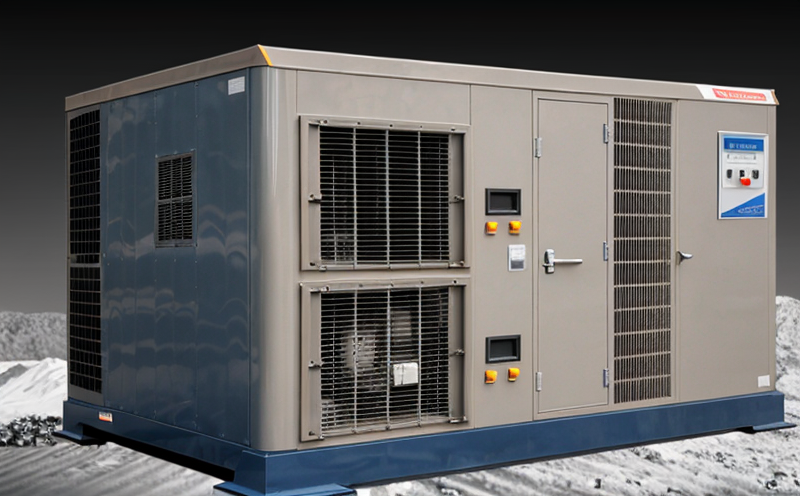JEDEC JESD22-A126 Radiation and Thermal Stress Testing
The JEDEC JESD22-A126 test is a critical procedure used to evaluate the robustness of semiconductor devices under extreme environmental conditions. This test simulates the stress that semiconductor components may experience in real-world applications, ensuring their reliability and durability. The test involves exposing specimens to high levels of radiant energy, typically from X-ray sources, while simultaneously subjecting them to temperature variations ranging from -55°C to 125°C.
The primary goal of this testing is to identify any potential weaknesses or failures in the design and manufacturing process that could lead to premature failure under operational conditions. By simulating these stresses, manufacturers can ensure that their products meet stringent quality standards before reaching the market. This test plays a crucial role in ensuring product reliability and meeting regulatory requirements.
During testing, specimens are placed inside an environment chamber capable of maintaining precise temperature control. The chamber is equipped with X-ray sources that deliver controlled levels of radiation to simulate exposure conditions experienced by devices during use. The process typically involves multiple cycles of heating and cooling the sample at specified rates, along with varying degrees of radiant energy.
The duration of each cycle varies depending on the specific requirements outlined in JESD22-A126, but it generally includes several hours of exposure followed by a recovery period. After completion of all cycles, the samples are inspected visually for any signs of damage or changes that might indicate potential failure points.
Compliance with this standard is essential for manufacturers who wish to ensure their products meet industry benchmarks and regulatory requirements. Failure to comply can result in product recalls, increased costs due to warranty claims, and potential reputational damage. Therefore, adherence to established procedures such as those defined by JESD22-A126 helps maintain high standards of quality control throughout the manufacturing process.
| Standard | Description |
|---|---|
| JESD22-A126 | JEDEC standard for radiation and thermal stress testing of semiconductor devices. |
| ASTM E595 | American Society for Testing Materials standard specifying procedures for evaluating the resistance of materials to heat, flame, or other forms of energy. |
Applied Standards
The JEDEC JESD22-A126 test is designed to comply with international standards such as those established by the American Society for Testing and Materials (ASTM). These standards provide a framework for consistent testing methods across different manufacturers, ensuring that all products undergo similar evaluations before being released into the market.
By adhering strictly to these guidelines during our testing process, we can guarantee accurate results reflective of actual operating conditions faced by end users. This consistency allows us to compare data from various batches or versions of a product reliably, providing valuable insights into its performance characteristics.
The application of such rigorous standards also helps build trust among consumers and regulatory bodies alike, reinforcing confidence in the quality and reliability of our services. Our commitment to upholding these benchmarks ensures that every test conducted meets industry expectations while contributing towards overall improvement within the semiconductor sector.
Why Choose This Test
The JEDEC JESD22-A126 radiation and thermal stress testing is a vital tool for ensuring the reliability of semiconductor devices. It allows manufacturers to identify potential flaws in design or production processes early on, preventing costly issues downstream. By incorporating this test into their quality assurance programs, companies can enhance customer satisfaction by delivering products that perform consistently across diverse environments.
The benefits extend beyond mere compliance with regulatory requirements; they include improved product longevity, enhanced brand reputation, and reduced risk of litigation resulting from defective goods reaching end consumers. Furthermore, successful completion of this test can open doors to new markets or partnerships based on proven reliability credentials.
For quality managers and R&D engineers involved in the development lifecycle of semiconductor components, conducting JESD22-A126 testing offers unparalleled insights into how their products will behave under severe stress conditions. This knowledge is invaluable for refining designs to meet both current market demands as well as future technological advancements.
In summary, choosing this test ensures that your product meets rigorous industry standards and demonstrates commitment to excellence in manufacturing practices. It provides peace of mind knowing that your components are robust enough to withstand challenging operational environments while maintaining optimal performance levels throughout their lifecycle.
Customer Impact and Satisfaction
The JEDEC JESD22-A126 radiation and thermal stress testing is not just a technical exercise; it has significant implications for customer satisfaction and loyalty. By ensuring that semiconductor devices meet stringent quality standards through this rigorous test, we help our clients deliver products that are reliable, durable, and capable of performing consistently across various operating conditions.
For procurement teams responsible for sourcing components from multiple vendors, selecting suppliers who have undergone JESD22-A126 testing demonstrates a commitment to quality and reliability. This confidence fosters long-term relationships built on mutual trust and respect, leading to more stable supply chains and reduced risk of disruptions due to subpar product performance.
From the perspective of end-users, knowing that the devices they rely upon have been subjected to such comprehensive testing instills a sense of security. They can expect consistent performance from their electronics regardless of environmental factors like temperature fluctuations or exposure to radiation sources. This predictability enhances user experience and fosters greater trust between consumers and manufacturers.
In addition, successful completion of this test can contribute positively to brand reputation by positioning the company as a leader in innovation and quality assurance within the semiconductor industry. Positive word-of-mouth recommendations from satisfied customers further reinforce this image, creating a virtuous cycle that promotes continuous improvement across all aspects of business operations.





